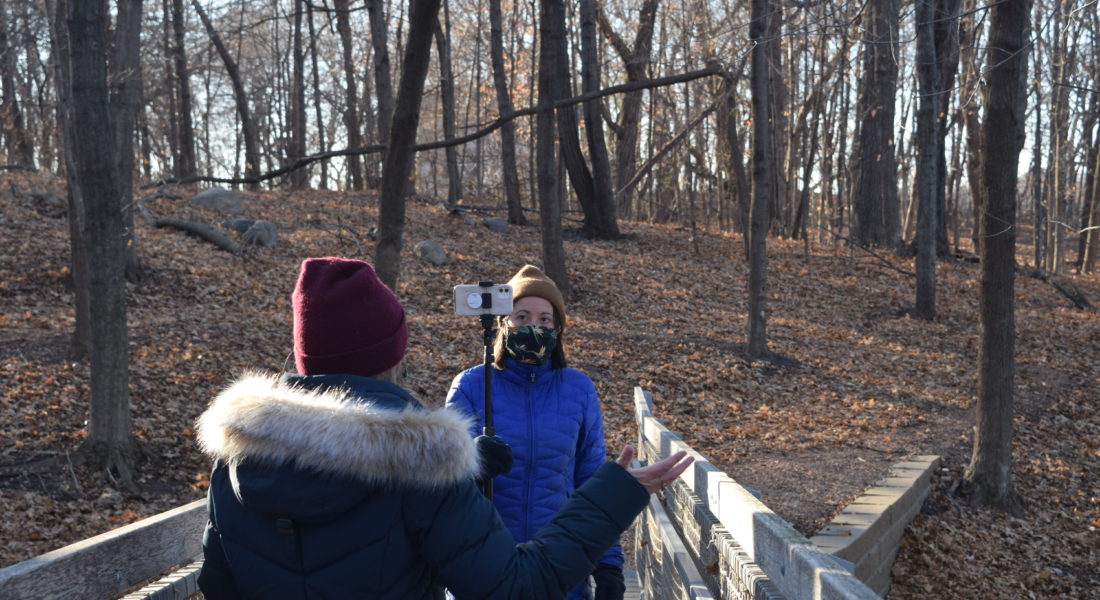“Everyone say hi to Greta!”
Caroline, one of Camp Fire’s naturalists, holds up Tanadoona’s resident turtle to the camera. Greta, a tiny false map turtle, wiggles its arms as the students’ faces light up—they’re delighted to see a real live animal onscreen.
Though these students will not meet Greta in person or get to wander through the woods at this time, our programs team has boundless ideas to make virtual lessons as engaging and hands-on as possible. In response to COVID-19 we’re offering free, live virtual environmental education lessons direct from Tanadoona to classrooms all over the Twin Cities, giving students a glimmer of nature.
Similar to our in-person K-12 Field Trip program, our naturalists teach everything from “Abloom with Aquaponics” to “Animal Adaptations,” covering a wide range of STEM and environmental education lessons to fit different classroom needs and ages. It’s exciting to connect with so many youth in a new way—some lessons are weekly, others are a one-time virtual “field trip.”

When COVID hit, time was of the essence—up until then our K-12 environmental ed field trips were designed to be in-person. Alexis M. Murillo, Education and Digital Programs Manager, wasted no time ensuring a swift transition to virtual learning, connecting with educators and other youth-serving organizations to hear how we could support them and their students.
Alexis emphasizes that it was (and still is) entirely a team effort. “The naturalists are the groundwork for how we do what we do. They were ready to adapt and adjust. They came up with all of the phenomenal ideas for how we were going to implement engaging lessons virtually.”
Bringing experiential learning to classrooms through the screen is no small feat.
Sam, Chris, Caroline, and Kelly, Camp Fire Minnesota’s naturalists, know a thing or two about the challenges of teaching environmental education in a virtual setting. For lessons at Tanadoona, students would normally be able to hear the birds, touch the leaves, and smell the woods; the thrill of being in a new place keeping them tuned into the lesson.
“In a virtual setting, youth get to discover animal signs right along with me in our Animal Adaptations lesson—they are experiencing it in real time. One student said she was so excited for the lesson, she couldn’t sleep the night before,” Kelly recalls.
“One of my favorite parts of being outside is teamwork and relationship building. There’s a lot of growth that happens when you’re in a new environment. To create that sense of growth online, we help to encourage the youth to lead by asking for tons of participation. That way they engage with each other and build on each other’s ideas,” explains Caroline.

And students (and their teachers) are fully engaging.
In the span of thirty minutes, one student went from not knowing what a wetland was to declaring, “I think one of us should become president or an elected official, so we can pass more laws to protect wetlands.”
Sarah Hempel, Online Academy (OLA) Kindergarten Teacher at Eastern Carver County Schools, feels the same. “The kinders were so engaged and excited! I just can’t express how happy I am to bring this little bit of ‘normal’ into our virtual classroom space as we explore the outdoors!”
We are here for our fellow educators – ready to bring environmental education enrichment into your classroom, all tied to MN State Education Standards. Our naturalists have been busy visiting multiple virtual classrooms a day, plus leading COVID-safe youth programs at Tanadoona.
Inspiring future environmental stewards is the heart of what we do—in-person and virtually!
To learn more or schedule a virtual visit, click here or contact Alexis M. Murillo, Education and Digital Programs Manager, at alexism@campfiremn.org.
A special thank you to the Opus Foundation, 3M Foundation, Xcel Energy Foundation, and MVEC for making our free virtual environmental education lessons possible.
